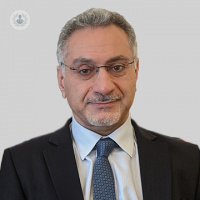What is rectal bleeding (blood in stool)?
Rectal bleeding simply refers to bleeding from one's bottom after the passing of a stool.

What might rectal bleeding signal?
Blood in your stool can signal that there is an issue somewhere along the gastrointestinal tract, and is most commonly a sign of non-cancerous conditions such as:
- crohn's disease
- ulcerative colitis
- haemorrhoids
- anal fissure
- colon polyps
However, it can also be a symptom of bowel or rectal cancer.
In what ways can rectal bleeding be noticed?
Blood in your stool can typically be noticed in the following scenarios:
- you may see it mixed in with your stool - whether that be diarrhoea or hard and dry stool
- light bleeding you find on your toilet paper
- enough drops of blood to change the colour of the water in your toilet bowl
- it can make your stool black and sticky
What are the causes of rectal bleeding?
Usually, it’s caused by non-cancerous conditions and isn’t a cause for worry. However, visiting a doctor is necessary to rule out more serious conditions.
Which specialist should I see for rectal bleeding?
Gastroenterologists are experts when it comes to diagnosing the exact cause of rectal bleeding. Once they determine the cause, they can recommend the most appropriate and effective treatment option(s).
When should I see a doctor for rectal bleeding?
Patients are highly recommended to see a doctor if they notice any of the following:
- their child has blood in their stool
- the patient has had blood in their stool for three weeks
- their stool has been softer, thinner, or longer than normal for three weeks
- they experience extreme pain around the anus
- they notice pain or a lump in the stomach
- they have lost weight without a reason
When is rectal bleeding considered a medical emergency?
Rectal bleeding should be treated as promptly as possible in the following situations:
- when the patient's stool is black or dark red
- when the patient notices bloody diarrhoea for no apparant reason

What will happen during my visit to a doctor for rectal bleeding?
Patients, before being referred to gastroenterologists, will typically be seen by a GP. During this consultation, a rectal examination will be performed, a stool sample will be requested, collected and hereafter examined, and, finally, the patient will be referred to a gastroenterologist for further testing.
What tests are usually performed to find out the cause of rectal bleeding?
Gastroenterologists will typically perform either a colonoscopy or a sigmoidoscopy to detect the exact cause of the symptom(s) associated with the patient's rectal bleeding.
How is rectal bleeding treated?
Treatment for rectal bleeding really depends on the underlying cause that has been detected. Almost in all cases though, treatment will involve medication, surgery, and/or lifestyle modifications.
What are the different types of rectal surgery that might be performed?
If haemorrhoids are causing one's rectal bleeding, then a haemorrhoidectomy will be performed. Other common types of rectal surgical procedures include a subtotal colectomy, a right hemicolectomy, a left hemicolectomy, a low anterior resection, and an abdomino-perineal resection.
01-23-2019 08-01-2023Blood in stool (rectal bleeding)
Mr Emin Carapeti - Colorectal surgery
Created on: 01-23-2019
Updated on: 08-01-2023
Edited by: Conor Lynch
What is rectal bleeding (blood in stool)?
Rectal bleeding simply refers to bleeding from one's bottom after the passing of a stool.

What might rectal bleeding signal?
Blood in your stool can signal that there is an issue somewhere along the gastrointestinal tract, and is most commonly a sign of non-cancerous conditions such as:
- crohn's disease
- ulcerative colitis
- haemorrhoids
- anal fissure
- colon polyps
However, it can also be a symptom of bowel or rectal cancer.
In what ways can rectal bleeding be noticed?
Blood in your stool can typically be noticed in the following scenarios:
- you may see it mixed in with your stool - whether that be diarrhoea or hard and dry stool
- light bleeding you find on your toilet paper
- enough drops of blood to change the colour of the water in your toilet bowl
- it can make your stool black and sticky
What are the causes of rectal bleeding?
Usually, it’s caused by non-cancerous conditions and isn’t a cause for worry. However, visiting a doctor is necessary to rule out more serious conditions.
Which specialist should I see for rectal bleeding?
Gastroenterologists are experts when it comes to diagnosing the exact cause of rectal bleeding. Once they determine the cause, they can recommend the most appropriate and effective treatment option(s).
When should I see a doctor for rectal bleeding?
Patients are highly recommended to see a doctor if they notice any of the following:
- their child has blood in their stool
- the patient has had blood in their stool for three weeks
- their stool has been softer, thinner, or longer than normal for three weeks
- they experience extreme pain around the anus
- they notice pain or a lump in the stomach
- they have lost weight without a reason
When is rectal bleeding considered a medical emergency?
Rectal bleeding should be treated as promptly as possible in the following situations:
- when the patient's stool is black or dark red
- when the patient notices bloody diarrhoea for no apparant reason

What will happen during my visit to a doctor for rectal bleeding?
Patients, before being referred to gastroenterologists, will typically be seen by a GP. During this consultation, a rectal examination will be performed, a stool sample will be requested, collected and hereafter examined, and, finally, the patient will be referred to a gastroenterologist for further testing.
What tests are usually performed to find out the cause of rectal bleeding?
Gastroenterologists will typically perform either a colonoscopy or a sigmoidoscopy to detect the exact cause of the symptom(s) associated with the patient's rectal bleeding.
How is rectal bleeding treated?
Treatment for rectal bleeding really depends on the underlying cause that has been detected. Almost in all cases though, treatment will involve medication, surgery, and/or lifestyle modifications.
What are the different types of rectal surgery that might be performed?
If haemorrhoids are causing one's rectal bleeding, then a haemorrhoidectomy will be performed. Other common types of rectal surgical procedures include a subtotal colectomy, a right hemicolectomy, a left hemicolectomy, a low anterior resection, and an abdomino-perineal resection.


Rectal bleeding – what does it mean?
By Mr Giovanni D. Tebala
2024-11-21
Rectal bleeding can be alarming, yet it is something many people experience in their lifetimes. Should we be worried? Is it worth getting checked out? We asked expert colorectal surgeon Mr Giovanni Tebala for these important answers. See more


Rectal bleeding: should I be worried?
By Dr Evangelos Russo
2024-11-21
It is estimated that up to 10% of the population will have an episode of rectal bleeding each year. Finding blood in your stool is often caused by anal fissures and piles, however you may be worried that something else more sinister might be causing it. Dr Evangelos Russo is a skilled gastroenterologist based in London and offers us his advice on what might be causing blood in your stool. See more


Rectal bleeding: does it require investigation?
By Mr Romi Navaratnam
2024-11-21
Rectal bleeding is a common condition and affects over 50%. But what causes it and does it always need to be investigated by a specialist? Top colorectal and laparoscopic surgeon based in London, Mr Romi Navaratnam explains. See more


Blood in stool: Your questions answered
By Dr Sarmed Sami
2024-11-20
Blood in stool, also known as rectal bleeding, is a medical symptom that can manifest as bright red blood, maroon-coloured stools, or black tarry stools. Blood in stool should never be ignored. Here, Dr Sarmed Sami, renowned consultant gastroenterologist, explores the common causes, symptoms, and potential treatment options for blood in stool. See more
Experts in Blood in stool (rectal bleeding)
-
Professor Richard Cohen
Colorectal surgeryExpert in:
- Anal fissure
- Blood in stool (rectal bleeding)
- Inflammatory bowel disease (IBD)
- Piles (haemorrhoids)
- Anal fistula
- Colonoscopy
-
Dr Richard Sarsam
GastroenterologyExpert in:
- Colonoscopy
- Blood in stool (rectal bleeding)
- Indigestion (dyspepsia)
- Capsule endoscopy
- Gastroscopy
- Bowel cancer screening
-
Mr Justin Davies
SurgeryExpert in:
- Colorectal cancer
- Blood in stool (rectal bleeding)
- Haemorrhoid surgery
- Anal fissure
- Anal fistula
- Inguinal hernia
-
Mr Pasha Nisar
Colorectal surgeryExpert in:
- Colonoscopy
- Hernia
- Piles (haemorrhoids)
- Blood in stool (rectal bleeding)
- Colorectal cancer
- Abdominal pain
-
Mr Romi Navaratnam
Colorectal surgeryExpert in:
- Blood in stool (rectal bleeding)
- Piles (haemorrhoids)
- Irritable bowel syndrome (IBS)
- Colonoscopy
- Minimal access surgery (keyhole surgery)
- Bowel cancer
- See all

Cleveland Clinic London Colorectal Unit
Cleveland Clinic London Colorectal Unit
33 Grosvenor Place
No existe teléfono en el centro.
By using the telephone number provided by TOP DOCTORS, you automatically agree to let us use your phone number for statistical and commercial purposes. For further information, read our Privacy Policy
Top Doctors

Digestive Health UK
Digestive Health UK
41 Welbeck St, London W1G 8DT
No existe teléfono en el centro.
By using the telephone number provided by TOP DOCTORS, you automatically agree to let us use your phone number for statistical and commercial purposes. For further information, read our Privacy Policy
Top Doctors

London Bridge Hospital - part of HCA Healthcare
London Bridge Hospital - part of HCA Healthcare
27 Tooley St
No existe teléfono en el centro.
By using the telephone number provided by TOP DOCTORS, you automatically agree to let us use your phone number for statistical and commercial purposes. For further information, read our Privacy Policy
Top Doctors
-
Cleveland Clinic London Colorectal Unit
33 Grosvenor Place, Central LondonExpert in:
- Cancer
- Colorectal surgery
- Minimal access surgery (keyhole surgery)
- Robotic Surgery
- Bowel cancer screening
- Inflammatory bowel disease
-
Digestive Health UK
41 Welbeck St, London W1G 8DT, Central LondonExpert in:
- Colonoscopy
- endoscopy
- Gastroenterology
-
London Bridge Hospital - part of HCA Healthcare
27 Tooley St, Central LondonExpert in:
- 24-hour service
- Cardiology
- Minimal access surgery (keyhole surgery)
- Orthopaedic surgery
- Cardiovascular disease
- Gastroenterology
- See all
- Most viewed diseases, medical tests, and treatments
- Migraine
- Paediatric rheumatology
- Autoimmune diseases
- Joint pain
- Child nutrition
- Nutrition
- Weight loss injections
- Nipple discharge
- Abdominal pain
- Endovenous laser treatment (EVLA)








